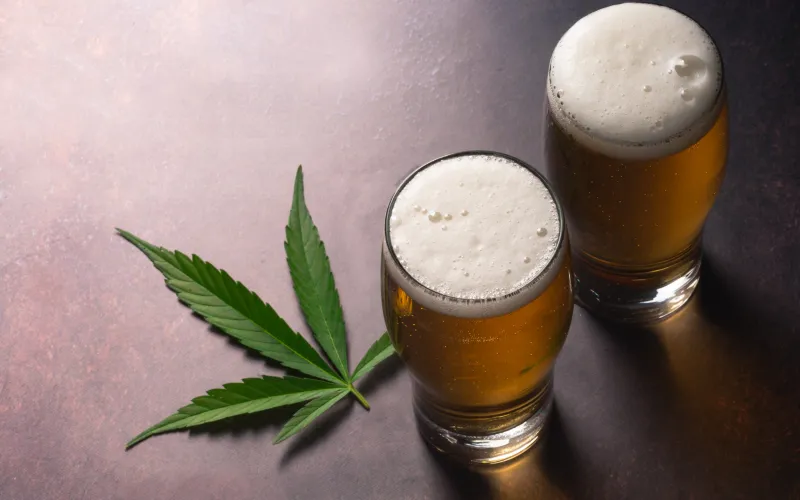Business
Minnesota Breweries See Benefits From State’s Cannabis Law

The new Minnesota measure created a distinction between hemp and pot-derived beverages.
A new cannabis law in Minnesota has the state’s craft brewers buzzing with excitement.
Local news station KARE reports that industry leaders “actually sought more regulations of THC-infused beverages as part of the adult-use cannabis bill, and came away very happy with the legislation Gov. Walz signed into law.”
According to the station, the new law “sets firm ground rules around who can make and sell low-dose hemp-derived THC drinks,” while also expanding “the market for those beverages because the same bill allows liquor stores to sell them for the first time.”
“It’s not every day you approach legislators and say, ‘Can we get more taxes? Can we get more regulations?’ but at the end of the day, our members wanted to make sure we were doing this in a legitimate and solidified way,” Bob Galligan of the Minnesota Craft Brewers Guild told KARE.
“Not quite everyone realizes just how revolutionary the actual low-dose, hemp-derived market is that we have in Minnesota.”
That market sprung up last year, after a new law took effect in Minnesota that allowed food and beverages to be infused with up to 0.3% THC.
The measure surprised a number of state lawmakers, particularly Republicans, who were unaware that they had effectively legalized marijuana in the state.
A year later, Minnesota legislators went even further, becoming the 23rd state to legalize recreational cannabis after Walz signed a bill into law in May.
“We’ve known for too long that prohibiting the use of cannabis hasn’t worked. By legalizing adult-use cannabis, we’re expanding our economy, creating jobs, and regulating the industry to keep Minnesotans safe,” Walz said at a signing ceremony. “Legalizing adult-use cannabis and expunging or resentencing cannabis convictions will strengthen communities. This is the right move for Minnesota.”
Minnesota Lieutenant Gov. Peggy Flanagan added: “Legalizing adult-use cannabis is about keeping our communities safe, advancing justice for Minnesotans, and investing in a strong economic future. Prohibiting the use of cannabis hasn’t worked and has disproportionately harmed communities of color across the state. By expunging nonviolent cannabis convictions, we are removing the barriers that prevent thousands of Minnesotans from fully returning to work, to their communities, and to their lives. This is how we make safer communities.”
As with most other legalization laws, Minnesota’s new measure allows adults aged 21 and older to possess and use cannabis, establishes a regulatory framework to set up a legal retail pot market, and creates a path for previous marijuana-related convictions to be expunged.
According to KARE, the new law imposes a 10% state tax on hemp-derived beverages, and distinguishes “the difference between hemp-derived products and those made from marijuana.”
“It recognized hemp as a federally legal product. We as brewers would not be able to sell a marijuana product. That would be federally illegal,” Dan Justesen, who owns and operates Utepils Brewing in Minneapolis, told the station. “The bill recognized what we were doing uniquely in Minnesota and kept it alive, allowing a lot of very small breweries like us to have a foot in the door and stay in the door.”
Justesen continued: “We saw the consumers liked it, wanted it and were buying, and so we looked at the reality we had coming out of COVID and dollars in means we stay open,” Justesen explained. “The legal serving size in Minnesota is 5 milligrams, so again, that’s us being a little bit conservative with how it started. The majority of Minnesotans, this was going to be a very new experience for them, or one they may not have had for a few decades. So, we thought giving them something that’s just gonna make them feel happy and not out of it was the way for us to go.”
Source: https://hightimes.com/news/minnesota-breweries-see-benefits-from-states-cannabis-law/
Business
New Mexico cannabis operator fined, loses license for alleged BioTrack fraud

New Mexico regulators fined a cannabis operator nearly $300,000 and revoked its license after the company allegedly created fake reports in the state’s traceability software.
The New Mexico Cannabis Control Division (CCD) accused marijuana manufacturer and retailer Golden Roots of 11 violations, according to Albuquerque Business First.
Golden Roots operates the The Cannabis Revolution Dispensary.
The majority of the violations are related to the Albuquerque company’s improper use of BioTrack, which has been New Mexico’s track-and-trace vendor since 2015.
The CCD alleges Golden Roots reported marijuana production only two months after it had received its vertically integrated license, according to Albuquerque Business First.
Because cannabis takes longer than two months to be cultivated, the CCD was suspicious of the report.
After inspecting the company’s premises, the CCD alleged Golden Roots reported cultivation, transportation and sales in BioTrack but wasn’t able to provide officers who inspected the site evidence that the operator was cultivating cannabis.
In April, the CCD revoked Golden Roots’ license and issued a $10,000 fine, according to the news outlet.
The company requested a hearing, which the regulator scheduled for Sept. 1.
At the hearing, the CCD testified that the company’s dried-cannabis weights in BioTrack were suspicious because they didn’t seem to accurately reflect how much weight marijuana loses as it dries.
Company employees also poorly accounted for why they were making adjustments in the system of up to 24 pounds of cannabis, making comments such as “bad” or “mistake” in the software, Albuquerque Business First reported.
Golden Roots was fined $298,972.05 – the amount regulators allege the company made selling products that weren’t properly accounted for in BioTrack.
The CCD has been cracking down on cannabis operators accused of selling products procured from out-of-state or not grown legally:
- Regulators alleged in August that Albuquerque dispensary Sawmill Sweet Leaf sold out-of-state products and didn’t have a license for extraction.
- Paradise Exotics Distro lost its license in July after regulators alleged the company sold products made in California.
Golden Roots was the first alleged rulebreaker in New Mexico to be asked to pay a large fine.
Source: https://mjbizdaily.com/new-mexico-cannabis-operator-fined-loses-license-for-alleged-biotrack-fraud/
Business
Marijuana companies suing US attorney general in federal prohibition challenge

Four marijuana companies, including a multistate operator, have filed a lawsuit against U.S. Attorney General Merrick Garland in which they allege the federal MJ prohibition under the Controlled Substances Act is no longer constitutional.
According to the complaint, filed Thursday in U.S. District Court in Massachusetts, retailer Canna Provisions, Treevit delivery service CEO Gyasi Sellers, cultivator Wiseacre Farm and MSO Verano Holdings Corp. are all harmed by “the federal government’s unconstitutional ban on cultivating, manufacturing, distributing, or possessing intrastate marijuana.”
Verano is headquartered in Chicago but has operations in Massachusetts; the other three operators are based in Massachusetts.
The lawsuit seeks a ruling that the “Controlled Substances Act is unconstitutional as applied to the intrastate cultivation, manufacture, possession, and distribution of marijuana pursuant to state law.”
The companies want the case to go before the U.S. Supreme Court.
They hired prominent law firm Boies Schiller Flexner to represent them.
The New York-based firm’s principal is David Boies, whose former clients include Microsoft, former presidential candidate Al Gore and Elizabeth Holmes’ disgraced startup Theranos.
Similar challenges to the federal Controlled Substances Act (CSA) have failed.
One such challenge led to a landmark Supreme Court decision in 2005.
In Gonzalez vs. Raich, the highest court in the United States ruled in a 6-3 decision that the commerce clause of the U.S. Constitution gave Congress the power to outlaw marijuana federally, even though state laws allow the cultivation and sale of cannabis.
In the 18 years since that ruling, 23 states and the District of Columbia have legalized adult-use marijuana and the federal government has allowed a multibillion-dollar cannabis industry to thrive.
Since both Congress and the U.S. Department of Justice, currently headed by Garland, have declined to intervene in state-licensed marijuana markets, the key facts that led to the Supreme Court’s 2005 ruling “no longer apply,” Boies said in a statement Thursday.
“The Supreme Court has since made clear that the federal government lacks the authority to regulate purely intrastate commerce,” Boies said.
“Moreover, the facts on which those precedents are based are no longer true.”
Verano President Darren Weiss said in a statement the company is “prepared to bring this case all the way to the Supreme Court in order to align federal law with how Congress has acted for years.”
While the Biden administration’s push to reschedule marijuana would help solve marijuana operators’ federal tax woes, neither rescheduling nor modest Congressional reforms such as the SAFER Banking Act “solve the fundamental issue,” Weiss added.
“The application of the CSA to lawful state-run cannabis business is an unconstitutional overreach on state sovereignty that has led to decades of harm, failed businesses, lost jobs, and unsafe working conditions.”
Business
Alabama to make another attempt Dec. 1 to award medical cannabis licenses

Alabama regulators are targeting Dec. 1 to award the first batch of medical cannabis business licenses after the agency’s first two attempts were scrapped because of scoring errors and litigation.
The first licenses will be awarded to individual cultivators, delivery providers, processors, dispensaries and state testing labs, according to the Alabama Medical Cannabis Commission (AMCC).
Then, on Dec. 12, the AMCC will award licenses for vertically integrated operations, a designation set primarily for multistate operators.
Licenses are expected to be handed out 28 days after they have been awarded, so MMJ production could begin in early January, according to the Alabama Daily News.
That means MMJ products could be available for patients around early March, an AMCC spokesperson told the media outlet.
Regulators initially awarded 21 business licenses in June, only to void them after applicants alleged inconsistencies with how the applications were scored.
Then, in August, the state awarded 24 different licenses – 19 went to June recipients – only to reverse themselves again and scratch those licenses after spurned applicants filed lawsuits.
A state judge dismissed a lawsuit filed by Chicago-based MSO Verano Holdings Corp., but another lawsuit is pending.
Source: https://mjbizdaily.com/alabama-plans-to-award-medical-cannabis-licenses-dec-1/
-

 Business2 years ago
Business2 years agoPot Odor Does Not Justify Probable Cause for Vehicle Searches, Minnesota Court Affirms
-

 Business2 years ago
Business2 years agoNew Mexico cannabis operator fined, loses license for alleged BioTrack fraud
-

 Business2 years ago
Business2 years agoAlabama to make another attempt Dec. 1 to award medical cannabis licenses
-

 Business2 years ago
Business2 years agoWashington State Pays Out $9.4 Million in Refunds Relating to Drug Convictions
-

 Business2 years ago
Business2 years agoMarijuana companies suing US attorney general in federal prohibition challenge
-

 Business2 years ago
Business2 years agoLegal Marijuana Handed A Nothing Burger From NY State
-

 Business2 years ago
Business2 years agoCan Cannabis Help Seasonal Depression
-

 Blogs2 years ago
Blogs2 years agoCannabis Art Is Flourishing On Etsy











